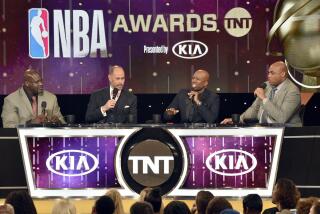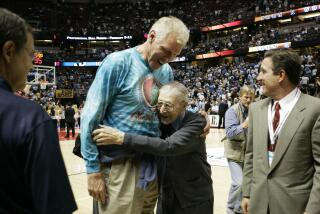Searching for Big-Time Antidote
- Share via
When Wilt Chamberlain first came into the NBA 33 years ago, the reaction of a lot of people was, “Well, there goes the old ballgame.”
The old ballgame was pro basketball, and the notion was Chamberlain would make a shambles of it. He would swallow it whole. He looked, in poor light, like an office building with knee pads. Gulliver. Goliath. The-Creature-That-Ate-Basketball. Fee-fi-fo-fum.
He would score 100 points a night. Make the league look like Lilliput. He was 7 feet 2 1/2 inches or 7 feet 4, depending on whether you believed him or the tape measure. He weighed 300 pounds. Fortunately for the world, he was gentle. If he got mad, you’d have to call out the National Guard.
He didn’t take over the league because William Felton Russell was already in it. There is a law of physics that, for every action, there is an equal and opposite reaction. And Bill Russell was it.
Of the 40 top scoring performances of all time, Chamberlain had 28 of them. But you will notice a curious thing: only one was against Boston, a 63-point night in 1962. You wonder if Russell suited up that night.
And, of the top 10 rebound performances, Chamberlain had six. Russell had the other four.
When Kareem Abdul-Jabbar came into the league, the reaction was, “Now, the end is near! Repent!” This was a warhead to turn the attack atomic. He was so good, they outlawed the dunk in college in honor of him.
Kareem didn’t post the glittering one-night performances. He just steadied his way to 25-30 points a night. Besides, the game had changed. Where once they stood out like stilt-walkers on Broadway, seven-footers became almost commonplace. The game abounded in them.
They used to call the guy who got the ball to Chamberlain “Wilt’s caddie.” But you certainly couldn’t call Abdul-Jabbar’s assisters, Magic Johnson and Oscar Robertson, anybody’s caddies.
Still, the formula seemed clear: get a big man in the pivot. Then, find a great athlete to go get him the ball--and watch the championships roll in.
Surprisingly, it stopped working. The Detroit Pistons, of all people, began to dominate the league. Then the Chicago Bulls. They played the pivot by committee. Their game was in the backcourt. Isiah Thomas, Joe Dumars and, of course, the incomparable Michael Jordan, kept the ball away from the big guys.
Big men came into the game without sending a chill through it. Hakeem Olajuwon and Ralph Sampson in Houston, Patrick Ewing in New York, David Robinson in San Antonio. But they could only get the ball by Federal Express some nights. Gulliver got tied down by the resident Lilliputs.
But, now, a shivering is perceived again in the land. A new mountainous creature is abroad on the boards, wreaking havoc on the glass, rattling the rims. Godzilla has landed. Every team in the league is running for cover.
Shaquille O’Neal is not only high, he’s wide. At 7 feet 1, 303 pounds, he looks as if he should have chairlifts running down the side of him. O’Neal is more than a building, he’s a skyline.
He has something to learn. He doesn’t have a sky hook, a fallaway jumper or a three-point shot. He has a tendency to throw his weight around, so he gets in foul trouble and has fouled out of six games this year.
But he has a finesse game that shocks people who have been studying seven-footers in the league for years. He has the power game, but he can actually bring the ball up court if he has to.
He has a vertical jump that looks like a missile coming out of a silo. Lots of guys can get above the rim in this league--but their knees?
He lights up every arena he goes into. What Magic Johnson did was sometimes appreciable only to the aficionados. What O’Neal does, leap high above the basket, hover for the top-of-the-backboard-pass and then slam it through with a flourish, needs no subtitles. It is perfectly comprehensible, even to non-fans. It is Ruth hitting a home run, Joe Louis landing the knockout punch. Caruso hitting high C.
A few of us were curious to eye this likely legend firsthand the other morning and journeyed out to the Forum for a scheduled news conference with this throwback to the glory days of one-man teams.
When you’re a superstar in the making, you can go one of two ways: You can become a recluse, a Garbo, snarl at invasions of your privacy, keep the world on hold, lock out society. Or, you can recognize an obligation to the people who made you rich--the aristocracy used to call it noblesse oblige--and pay your dues and make yourself a part of your sport and not above it.
Arnold Palmer showed the world the wisdom of making yourself visible and available. He was almost the first to quadruple his income off the course by dramatizing himself and his game in public. It kept Arnold in airplanes.
Magic Johnson did it in basketball. Magic figured there was no sense in being the world’s greatest player if nobody knew about it. Besides, if the President of the United States had press conferences, why not point guards?
I am happy to say Shaquille O’Neal is in that mold. There have been superstars in this league who have actually acted as if they were unhappy with their talent. Almost as if they were held captive by it. They never seemed to be enjoying the way they made their money, as if they made it cleaning toilets. They would just take the money and run.
Shaquille O’Neal seems to be having a ball in his line of work. He was only a few minutes late for his interview, thus causing several longtime observers to lose bets it would run more to half-hours.
When someone wanted to know why he does this in NBA cities--maybe nobody briefed him on the way a superstar is supposed to act--he explained politely there were things you had to do that you might not want to do when you made $40 million on the floor and double that on Madison Avenue. It was no worse than the nightly double-team and triple-team he got in the key.
In the game that followed Tuesday night, the public showed they had been paying close attention to his clippings. They didn’t come to see Los Angeles play Orlando. They came to see Shaq attack the boards. On the frequent occasions he went to the bench (he got in foul trouble again with five), they screamed, “Bring back Shaq!” The game was just a backdrop, the other players just the chorus.
He threw in 31 points in 32 minutes, hauled down 14 rebounds. He made 13 of 17 shots, some at point-blank range seven feet above the action. He’s as unstoppable as a runaway boxcar on a grade.
He’s only 20 years old.
The league better hope there’s a Bill Russell out there some place before he matures.
More to Read
Go beyond the scoreboard
Get the latest on L.A.'s teams in the daily Sports Report newsletter.
You may occasionally receive promotional content from the Los Angeles Times.










